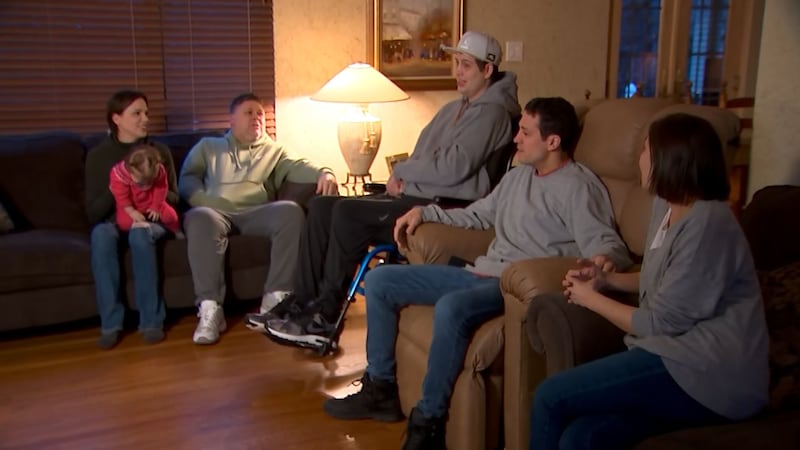HARRISBURG, Pa. — Gov. Josh Shapiro will deliver his first budget to the Legislature on Tuesday, as the Democrat aims in his first months to remake the state’s public school funding system and to put Pennsylvania on competitive footing with other states to attract major companies.
Shapiro has been touring the state speaking to business audiences, promising to be a cheerleader for the nation’s No. 2 natural gas state and to ensure state government speeds along permits to businesses seeking to hire, dig or build.
One big Shapiro campaign promise is to cut Pennsylvania’s sky-high corporate income tax rate by more than half within two years as Pennsylvania competes for a federally funded hydrogen hub and tries to attract the kind of multibillion-dollar battery plants and microchip factories landing in other states.
Shapiro also is vowing to make a “down payment” on the billions of dollars that public school advocates say are necessary to fix disparities between poor and wealthy school districts in Pennsylvania. Watching closely will be the school districts that won a landmark court decision last month that said the state’s public schools funding system is violating the constitutional rights of students.
Shapiro, the former state attorney general, is riding a huge election victory in the presidential battleground and has billions in state surplus cash to help him meet campaign promises.
He also has promised to work with Republicans and sow bipartisan peace.
But Shapiro is saddled with a slow-growing economy, grim demographic trends and what he calls a “workforce crisis” that is making hiring for social services, schools, police departments and hospitals harder.
Most details of Shapiro’s budget plan for the 2023-24 fiscal year, which starts July 1, remain under wraps.
Whatever Shapiro proposes will require passage from the Democratic-controlled House of Representatives and the Republican-controlled Senate. Appropriations Committee hearings start March 20.
Here’s what to watch for when it becomes public Tuesday:
___
WHAT WE KNOW
Shapiro has thus far focused on improving the business climate for companies and kitchen-table math for Pennsylvanians.
For starters, Shapiro said he will propose a three-year incentive of up to $2,500 a year for newly certified teachers, police officers and nurses to help address complaints from school boards, police departments and hospitals about the growing difficulty in filling critical positions.
He said he will seek more money for child care subsidies and for grants for local civic improvement projects, university research on cutting-edge manufacturing and science, computer and math programs in schools.
Shapiro also told a meeting of the Allegheny Conference on Community Development in Pittsburgh that “you will see investments” in energy in his plan.
___
SPENDING
Shapiro will almost certainly propose an operating budget that spends above this year’s $42.8 billion approved plan.
Shapiro is under pressure from allies to substantially increase spending on K-12 aid and perhaps the only question is how closely he will align with them.
Lawyers for the winning school districts say $2 billion is a good start this year. Sen. Vincent Hughes, D-Philadelphia, wants $3.1 billion, including $1 billion for cleaning up health hazards like mold, asbestos and lead in old school buildings.
Shapiro has lots of help.
Pennsylvania is in a sweet spot — like other states — because billions in federal pandemic aid and inflation-juiced tax collections have left $11 billion in reserves.
Meanwhile, the state will begin removing hundreds of thousands of people from Medicaid rolls after April 1 when the federal government ends its pandemic-era prohibition against kicking people off the program, even if they are no longer eligible.
That, plus federal pandemic subsidies for Medicaid that extended into this fiscal year, could mean more than $1 billions in savings.
Still, a legislative agency, the Independent Fiscal Office, projects that Pennsylvania will soon return to its long-term pattern of deficits.
___
TAXES
Shapiro said he will propose no tax increases, only tax cuts.
During his campaign, Shapiro proposed eliminating sales and gross receipts taxes on cell phone bills — a total of 11% — and slashing the 8.99% corporate net income tax rate to 4% by 2025. Tax collections on cell phone bills are about $300 million annually while the corporate net income tax is on track to collect more than $5 billion in this fiscal year.
Still, Shapiro may be pushed by allies to fix a tax system that is considered one of the nation’s most regressive and to continue a decade-long pursuit of a severance tax on the state’s booming natural gas industry.
___
CAMPAIGN PROMISES
Shapiro will not follow through on one key campaign promise: sending $250 to households for each vehicle, paid for by federal pandemic aid. That federal aid is now committed, his aides say.
The fate of other campaign promises remains to be seen.
Shapiro proposed expanding property taxes and rent subsidies for the elderly and disabled by hundreds of millions of dollars.
He also discussed ensuring rural hospitals can survive, providing a mental health counselor in every school building, raising the minimum wage to $15 an hour and getting Pennsylvanians to consume 30% of their electricity from renewable sources by 2030.
___
COST PRESSURES
Besides fixing disparities in public school funding, school boards are pressing for relief from the cost of paying for charter school tuition, while Democratic lawmakers are pushing to restart a dormant program subsidizing school construction projects.
Transportation is also a pressure point, even though Pennsylvania’s gasoline taxes are among the nation’s highest. Last year, PennDOT said its budget for construction and maintenance was less than half of the $15 billion necessary to keep highways and bridges in good condition and ease major traffic bottlenecks.
Meanwhile, providers of services for the intellectually disabled and autistic say the system is collapsing as they close programs because of underfunding and staffing shortages. They are seeking another $430 million, or 15% more, in state aid.
Counties say the safety-net mental health services they manage are in crisis, without enough beds or counselors for people who need help. They say they are relying on the same amount of state aid from a decade ago even after demand spiked during the COVID-19 pandemic.
Download the FREE WPXI News app for breaking news alerts.
Follow Channel 11 News on Facebook and Twitter. | Watch WPXI NOW
TRENDING NOW:
©2023 Cox Media Group








